Russian President Vladimir Putin’s allies have changed their tune about House Speaker Mike Johnson after he supported additional aid for Ukraine, calling him a “traitor” for going against his political party’s opposition to the spending measure. The House passed a $60.8 billion spending package to support Ukraine in its war against Russia, which Johnson deemed as the right thing to do. President Joe Biden and Democrats also supported the measure, urging the Senate to pass it immediately.
Kremlin propagandist host Vladimir Solovyov criticized Johnson on his television talk show, accusing him of being a traitor for supporting the bill and implying that he was lured to the Democratic side by Biden. Russian state-run media had previously shown affection for Johnson, referring to him as “our Johnson.” Solovyov’s comments reflect a growing divide within the Republican Party over support for Ukraine, with some conservatives like Marjorie Taylor Greene also speaking out against Johnson and the aid package.
Greene, a Georgia representative, introduced a motion to vacate against Johnson after he worked with Democrats to pass a $1.2 trillion federal spending bill, avoiding a government shutdown. She was praised by Kremlin propagandist Margarita Simonyan during Solovyov’s talk show, calling her “a real beauty” for her actions. Greene has been featured on Russian state TV and has been accused of parroting Kremlin propaganda, although she has denied such claims.
The passing of additional aid to Ukraine has caused tension within the Republican Party, with Johnson facing criticism from both his political allies and Putin’s allies in Russia. The shift in narrative reflects the ongoing geopolitical conflicts between Russia and Ukraine, as well as the internal struggles within the GOP. Johnson’s support for the Ukraine aid package has put him at odds with some of his fellow Republicans, highlighting the party’s divisions on foreign policy and national security issues.
The passage of the Ukraine aid package marks a significant shift in U.S. policy towards Russia and Ukraine, with bipartisan support for supporting Ukraine in its conflict with Russia. Johnson’s decision to support the bill, despite opposition from some within his party, underscores the complexity of U.S. foreign policy and the challenges of navigating international relations. The fallout from Johnson’s support for Ukraine highlights the broader political landscape in both the United States and Russia, with implications for future diplomatic relations between the two countries.
Overall, the controversy surrounding House Speaker Mike Johnson’s support for additional aid to Ukraine highlights the complexities of U.S. foreign policy and the challenges of navigating international relations in a polarized political landscape. The divisions within the Republican Party over support for Ukraine reflect broader geopolitical tensions between Russia and Ukraine, as well as internal struggles within the GOP. The fallout from Johnson’s decision underscores the importance of bipartisan cooperation on key foreign policy issues and the impact of domestic politics on international relations.


